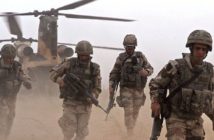Miami Herald
BY PAUL SCHEMM
ASSOCIATED PRESS

Huge trucks like this one outside Sebha in southern Libya on Sept. 22, 2013, are used to haul people and good, and sometimes smuggle weapons, to Niger to the south. In the rocky mountains and dune-covered wastes of southwestern Libya, al-Qaida’s North African branch has established a haven and is now restocking weapons and mining disaffected minorities for new recruits as it prepares to relaunch attacks. (AP Photo/Paul Schemm). Paul Schemm / AP
SEBHA, Libya — Swathed in a white turban and robes, Eissa Abdel Majid sits in his militia barracks on the edge of the desert describing a losing battle to stem the flow of armed militants with suspected links to al-Qaida — who use it as a freeway across northern Africa.
He says he’s fed up with trying to guard borders and oil installations in a power vacuum left by the fall of Moammar Gadhafi: “They are getting weapons and building their strength,” he says, “because the government is weak.”
In the rocky mountains and dune-covered wastes of southwestern Libya, al-Qaida’s North African branch has established a haven after French and West African forces drove them out of their fledgling Islamic state in northern Mali a year ago. Now, according to interviews with local soldiers, residents, officials and Western diplomats, it is restocking weapons and mining disaffected minorities for new recruits as it prepares to relaunch attacks. It’s an al-Qaida pattern seen around the world, in hot spots such as Yemen, Somalia, Afghanistan and increasingly here in North Africa: seemingly defeated, the terror network only retreats to remote areas, regroups and eventually bounces back — pointing to the extreme difficulties involved in stamping out the threat.
Mohamed, an officer in the Libyan army based in Ubari — the last major town in the south before the Saharan sands reach the borders of Niger and Algeria — said that his soldiers frequently run into SUVs filled with armed bearded men from Mali, Algeria and Libya coming here to buy weapons and supplies.
“There are occasional clashes with them but their forces are stronger than ours,” said the officer who wore surplus U.S.-style digital camouflage with Libyan army patches sewed on. He asked that his last name not be used for fear of being targeted by jihadists. Mohamed said many people in Ubari are active sympathizers or at least trade with these militants, whom he described as linked to al-Qaida.
“Most people know who they are but without a central government, you can’t really do anything,” he said. “We can do little on the borders and sometimes we just let them through.”
U.S. officials have confirmed the existence of al-Qaida-linked camps in southwest Libya, and a U.N. official based in Sebha, Libya’s main southern city, described the extremist group as being “all around” the area. A high-level Algerian army officer based in the Saharan city of Tamanrasset also confirmed al-Qaida’s presence in Libya and said his forces were remaining vigilant along the Mali border despite plans for a new African force once the French pull out.
From desert bases, experts and Western officials say, al-Qaida in the Islamic Maghreb, or AQIM, is building up links with like-minded jihadists in northern Libya, especially in eastern coastal cities such as Derna and Benghazi, as well as militant groups in Nigeria, and preparing for new attacks on Western targets.
One prominent Morocco-based al-Qaida expert, who has interviewed former and current leaders of AQIM in Mauritania, said there are even signs the group is preparing to recapture lost territory northern Mali once the French leave.
“The strategy that people told me in Mauritania was that they always withdraw to Libya where they can hide and wait for the French to leave,” said Djalil Lounnas, an Algerian researcher at the University of Montreal’s Center for International Peace and Security Studies.
The growing al-Qaida presence in southern Libya has raised concerns in the West, with one British official describing the security situation in the region as potentially more dangerous than before the French intervened. The official spoke on condition of anonymity because he is not authorized to speak publicly about security matters. Since the French intervention in Mali, at least two deadly attacks on Western targets in nearby Niger were launched from southern Libya.
While the al-Qaida militants move throughout this desert region, their camps are mostly hidden in the valleys of the Akkakush mountains north of the town of Ghat, on Libya’s border with Algeria, said Claudia Gazzini, the Libya-based analyst for the International Crisis Group, who based her information on Tuareg military commanders based there.
The Tuareg are a nomadic desert people spread across the Sahara throughout Mali, Niger, Libya, Algeria and Mauritania. With no state of their own, they have mounted revolts for independence numerous times over the past decades. While their rootlessness and grievances make them receptive to al-Qaida’s message, their deep knowledge of the terrain make them an invaluable resource for a terror network seeking to rebuild in hiding.
In a Sebha slum filled with thousands of displaced Tuareg, members of the nomadic people say al-Qaida often provides the best shot at a decent future.
“We have seen (Tuareg) go up to eastern Libya and return with beards, Islamic-style outfits and talking about religion — they pay money so anything is possible,” said Abdallah Sherif, a Tuareg doctor and social worker, who said he has witnessed al-Qaida recruiting attempts first hand.
Next to him, Ali Suleiman, a Tuareg who says he fought for an independent state in northern Mali last year, speaks of despair in the slums: “If you leave someone in such conditions,” he said, “they will join extremist groups like al-Qaida or become drug smugglers.”
In a November conference on border security in this desert region, French Foreign Minister Laurent Fabius said disenfranchised groups like the Tuareg have to be helped economically in order to reduce the incentive for them to become al-Qaida allies. “In Libya we need to involve the minorities living across the borders and they need to have legal status,” he said. “This calls for the economic development of the region.”
Intermarrying with the Tuareg has given al-Qaida the support of these tribal people and allowed them to move quickly across Africa through the desert.
“Some members of the Tuareg community are acting as support staff, bringing food and water into these valleys,” Gazzini said, noting that the same region once supported a desert safari industry. “It’s the same setup as when the tourists were in these areas.”
According to the men guarding the borders and patrolling the desert, al-Qaida militants take their four wheel drive vehicles east across the country and then north up to Benghazi and Derna — the intellectual heart of Libya’s jihadism.
It was in Libya’s coastal areas that the anti-Gadhafi Libyan Islamic Fighting Group was formed in the 1990s, some of whose members later joined al-Qaida, while others became part of the new Libyan government. It’s also the home of the Ansar al-Shariah movement that has been linked to the deadly attack on the U.S. mission in Benghazi that killed Ambassador Christopher Stephens and three other diplomats last year.
While al-Qaida seeks new friends in southern Libya, it is also exploiting enmities between the area’s dominant Arab tribes — who long controlled the region — and the Tuareg and Tabu peoples who have created their own militias since Gadhafi’s fall.
In Sebha, there are already 27 militias vying for power, leaving little hope for any concerted push against al-Qaida. Pitched battles have flared several times in the last year, especially between the Tabu and Arab tribes.
Al-Qaida has developed ties with several different militias and keeps a low profile while the different factions clash, several militia leaders and smugglers told AP on condition of anonymity for fear of reprisals.
It’s a situation that allows al-Qaida to operate at will: Abdel Majid, the militia leader in Sebha, describes witnessing a constant flow of jihadists between Ubari and Derna.
“Arabs from Derna came down to join the battle in Mali and then headed back in the other direction,” he said.
Associated Press writers Paisely Dodds in London, Jamey Keaten in Paris and Aomar Ouali in Algiers, Algeria contributed to this report.






